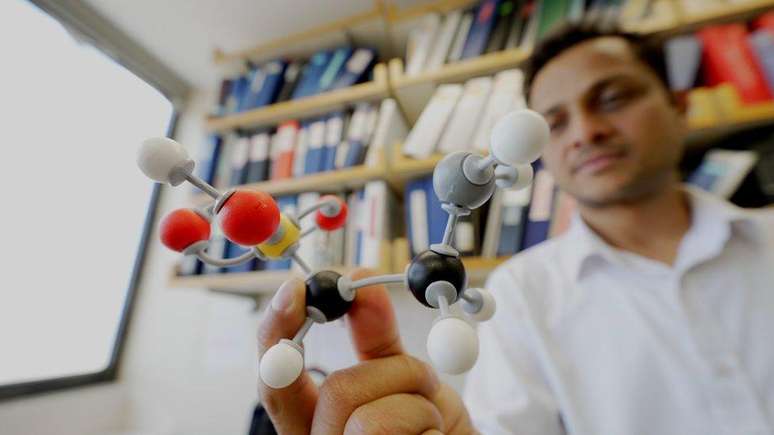Researchers believe the nutrient could be an “elixir of life,” but aren’t recommending buying it until more research is done.
Taurine — a nutrient found in meat, fish and sold as a supplement — prolongs life and improves health in a variety of animal species, scientists say.
Taurine levels decrease with age in several species, including humans.
Experiments conducted on middle-aged animals showed that increasing their levels from those found in their youth extended life by more than 10% and improved physical and brain health.
Researchers say taurine may be an “elixir of life,” but restoring its levels hasn’t yet been tested in humans.
Therefore, the team from Columbia University in New York, USA, does not recommend that people buy taurine pills or energy drinks that contain taurine in an attempt to live longer.
Animal research is, however, the most recent advance in finding ways to delay aging.

This study began by analyzing molecules in the blood of different species to explore the differences between young and old.
“One of [moléculas] the most drastically reduced was taurine,” says researcher Vijay Yadav. In the elderly, the levels were 80% lower than in the young.
Taurine is practically non-existent in plants. The nutrient comes from animal protein found in the diet or is produced by the body.
And for the past 11 years, the research team has been trying to unravel its role in aging.
“Better Memory”
A daily dose was given to mice aged 14 months, which is equivalent to approximately 45 years in humans.
The findings, published in the academic journal Science, show that male mice lived 10% longer and females 12% longer, both appearing to be in better health.
“The mice that received the taurine supplement were healthier and looked younger,” says Yadav. “They were leaner, had higher energy expenditure, higher bone density, better memory and younger-looking immune systems.”
Lifespan increases of 10% to 23% have also been recorded in worms.
Then 15-year-old rhesus monkeys were given taurine for six months, too short a time to notice a difference in lifespan, but again the researchers saw improvements in body weight, bone, blood sugar levels and in the immune system.
“I thought it was almost too good to be true,” says Henning Wackerhage, who participated in the research at the Technical University of Munich in Germany.
“Taurine somehow affects the engine room of aging.”
But many of the big questions remain unanswered:
– Would the same results be possible in humans?
– Why are taurine levels decreasing in the first place if it’s so good for your health?
– How does it slow down aging?
– Is there any risk in taking taurine?
Researchers conducted an analysis of 12,000 people and showed that those with the most taurine in their blood generally had better health.
If the mouse data were applied to humans, they say it would be the equivalent of seven to eight more years of life. But it will take proper clinical trials — in which some people are given the nutrient and others a placebo pill — to see if any benefit can be detected.
Differences in human biology could be keeping taurine from working, or there could be some evolutionary reason why your levels should decline as you age.
Current evidence, including energy drinks that have been on the market for decades, suggests that taurine is safe.
Healthy diet
Although taurine is present in our diet, it would be difficult to ingest the amounts used in the experiments. The equivalent dose from animal experiments, calculated proportionally for humans, would be between 3 and 6 g per day.
Yadav declined to say whether he chose to take taurine supplements himself, out of fear of undue influence.
“We are waiting for clinical trials to be completed before recommending that the general population go to the shelf in a supermarket and buy taurine,” he told BBC News.
Wackerhage suggests that instead of chasing supplements, there are already proven ways to live longer.
“If you want to live a long, healthy and happy life, you have to eat healthy—that’s one of the most important things—and, of course, you should exercise,” she advises.
power plants
The scientific report suggests that taurine plays a role in reducing cellular senescence — when the body’s cells stop dividing — a hallmark of aging.
The nutrient also appears to keep mitochondria, the “power plants” in the body’s cells, functioning.
But how this all happens remains unexplored.
Commenting on the findings, Joseph McGaunn and Joseph Baur, both of the University of Pennsylvania, USA, cautioned:
“A focus on increasing dietary taurine is likely to lead to poor nutritional choices because diets rich in fruits and vegetables are associated with human health and longevity.”
“Thus, like any intervention, taurine supplementation with the goal of improving human health and longevity should be approached with caution.”
Source: Terra
Rose James is a Gossipify movie and series reviewer known for her in-depth analysis and unique perspective on the latest releases. With a background in film studies, she provides engaging and informative reviews, and keeps readers up to date with industry trends and emerging talents.


-qhia6ba319wh.png)




